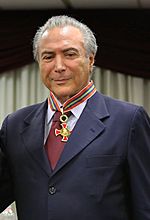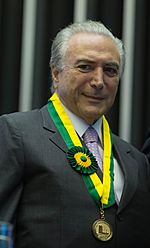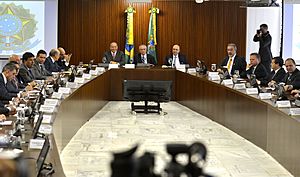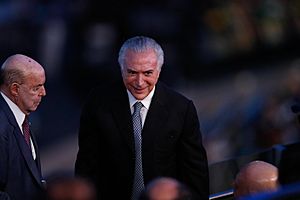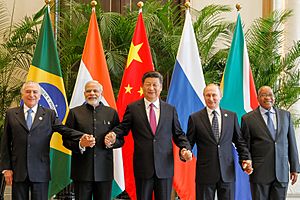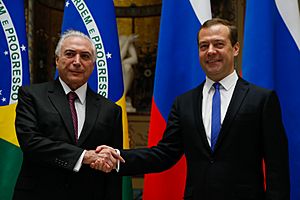Michel Temer facts for kids
Quick facts for kids
Michel Temer
|
|||||||||||||||||||||||||||||||
|---|---|---|---|---|---|---|---|---|---|---|---|---|---|---|---|---|---|---|---|---|---|---|---|---|---|---|---|---|---|---|---|
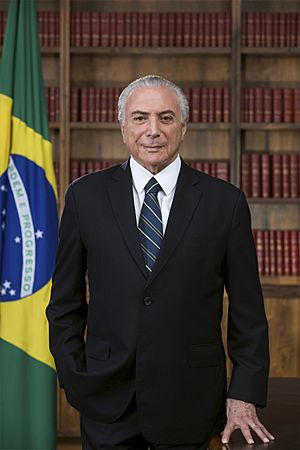
Official portrait, 2017
|
|||||||||||||||||||||||||||||||
| 37th President of Brazil | |||||||||||||||||||||||||||||||
| In office 31 August 2016 – 1 January 2019 Acting: 12 May – 31 August 2016 |
|||||||||||||||||||||||||||||||
| Vice President | None | ||||||||||||||||||||||||||||||
| Preceded by | Dilma Rousseff | ||||||||||||||||||||||||||||||
| Succeeded by | Jair Bolsonaro | ||||||||||||||||||||||||||||||
| 24th Vice President of Brazil | |||||||||||||||||||||||||||||||
| In office 1 January 2011 – 31 August 2016 |
|||||||||||||||||||||||||||||||
| President | Dilma Rousseff | ||||||||||||||||||||||||||||||
| Preceded by | José Alencar | ||||||||||||||||||||||||||||||
| Succeeded by | Hamilton Mourão (2019) | ||||||||||||||||||||||||||||||
| President of the Chamber of Deputies | |||||||||||||||||||||||||||||||
| In office 2 February 2009 – 17 December 2010 |
|||||||||||||||||||||||||||||||
| Preceded by | Arlindo Chinaglia | ||||||||||||||||||||||||||||||
| Succeeded by | Marco Maia | ||||||||||||||||||||||||||||||
| In office 5 February 1997 – 14 February 2001 |
|||||||||||||||||||||||||||||||
| Preceded by | Luís Eduardo Magalhaes | ||||||||||||||||||||||||||||||
| Succeeded by | Aécio Neves | ||||||||||||||||||||||||||||||
| Member of the Chamber of Deputies | |||||||||||||||||||||||||||||||
| In office 6 April 1994 – 30 December 2010 |
|||||||||||||||||||||||||||||||
| Constituency | São Paulo | ||||||||||||||||||||||||||||||
| In office 16 March 1987 – 1 February 1991 |
|||||||||||||||||||||||||||||||
| Constituency | São Paulo | ||||||||||||||||||||||||||||||
|
|||||||||||||||||||||||||||||||
|
|||||||||||||||||||||||||||||||
| Personal details | |||||||||||||||||||||||||||||||
| Born | 23 September 1940 Tietê, São Paulo, Brazil |
||||||||||||||||||||||||||||||
| Political party | MDB (since 1981) | ||||||||||||||||||||||||||||||
| Spouses | |||||||||||||||||||||||||||||||
| Domestic partners | Neusa Popinigis (sep.) Érika Ferraz (sep.) |
||||||||||||||||||||||||||||||
| Children | 5 | ||||||||||||||||||||||||||||||
| Alma mater | University of São Paulo Pontifical Catholic University of São Paulo |
||||||||||||||||||||||||||||||
| Signature | |||||||||||||||||||||||||||||||
Michel Miguel Elias Temer Lulia (born 23 September 1940) is a Brazilian politician, lawyer, and writer. He served as the 37th president of Brazil from 31 August 2016 to 1 January 2019. Before becoming president, he was the 24th vice president from 2011.
He became president after his predecessor, Dilma Rousseff, was removed from office. Temer had been acting president since May 2016 while her case was being decided. When the Senate voted to remove Rousseff, Temer officially took over as president.
During his time as president, Temer focused on changing the pension system and labor laws. He also aimed to control government spending. He did not run for president in the 2018 Brazilian general election and was succeeded by Jair Bolsonaro.
Contents
Early Life and Education
Michel Temer was born in Tietê, São Paulo, Brazil. His parents, Nakhoul "Miguel" Elias Temer Lulia and March Barbar Lulia, were immigrants from Lebanon. They came to Brazil in 1925 to escape difficult times after World War I.
Temer was the youngest of their five children born in Brazil. As a child, he dreamed of becoming a pianist, but there were no teachers nearby. Later, he wanted to be a writer.
In 1957, he moved to São Paulo to finish high school. He focused on subjects like history and languages. In 1959, he joined the Law School of the University of São Paulo, just like his older brothers. He graduated in 1963.
While in college, Temer became involved in student politics. He served as a treasurer for the school's students' union. In 1974, he earned a special degree in public law from the Pontifical Catholic University of São Paulo.
Academic Career and Writings
In 1968, Temer began teaching constitutional law at PUC-SP. He also taught civil law there. He was involved in different departments related to law studies.
Important Books
Temer wrote four main books about constitutional law. His most well-known book is Elements of Constitutional Law, published in 1982. This book sold over 240,000 copies. It explains how the Brazilian government is organized, especially the idea of separation of powers.
In 2006, he published Democracy and Citizenship. This book talked about the importance of law and included some of his speeches. In his writings, he supported a parliamentary system of government. He also favored a system where citizens could remove elected officials from office if needed.
In 2013, Temer published a book of poems called Anonymous Intimacy. He said writing poems helped him relax from the busy world of politics. Many of these poems were written on napkins during his plane trips.
Political Journey
Michel Temer had a long career in Brazilian politics. Starting in 1987, he served six terms in the Chamber of Deputies. This is like the House of Representatives in other countries. He was also chosen three times to be the president of the Chamber.
Temer was part of the group that wrote the current Constitution of Brazil in 1988. He also became the leader of the Brazilian Democratic Movement Party (PMDB), which was the largest political party in Brazil.
He was the second Vice President of Lebanese background. His family came from a village in northern Lebanon.
Investigations and Allegations
During his political career, Michel Temer faced several investigations regarding campaign funding and alleged improper payments. These investigations were part of a larger effort to fight corruption in Brazil.
For example, there were claims that he received funds from a construction company. Temer stated that these were legal campaign donations. The courts later dismissed some of these claims. He consistently denied any wrongdoing in all the allegations against him.
In 2017, federal police said they found evidence that Temer received payments to help businesses. A video was released showing a former aide carrying a suitcase of cash, which was allegedly for the president. Temer denied these accusations.
In 2018, a Supreme Court Justice ordered Temer to be included in an investigation. This investigation looked into funds his party allegedly received from another construction firm.
Role in Dilma Rousseff's Impeachment
Temer was involved in the process that led to the removal of President Dilma Rousseff. In 2015, he sent a letter to the president. In the letter, he complained about feeling left out of government decisions. He felt like a "decorative" vice president.
In April 2016, an audio recording of Temer was leaked. In the recording, he spoke as if the impeachment process was already over and he was the new president. Temer said the audio was accidentally sent to a group of his party's representatives. This caused controversy and led to accusations that he was working against the elected president.
Becoming Acting President
On 12 May 2016, the Senate voted to accept Rousseff's impeachment. This meant her powers were suspended, and Temer became acting president. He served in this role for several months while the Senate decided whether to permanently remove Rousseff.
As acting president, Temer formed a new cabinet. He reduced the number of government ministries. He also signed a law in June 2016 to improve how state-owned companies are managed. This law aimed to increase transparency and ensure that leaders of these companies had professional experience.
In August 2016, he officially opened the 2016 Summer Olympics in Rio de Janeiro.
President of Brazil
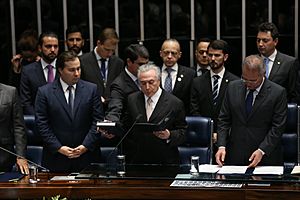
On 31 August 2016, the Senate voted to remove Dilma Rousseff from office. This made Michel Temer the official President of Brazil. He served the rest of Rousseff's term, which ended on 31 December 2018. After he became president, the vice-president position became empty. The President of the Chamber of Deputies, Rodrigo Maia, then became the next in line to take over if needed.
In October 2016, the Brazilian Constitution was changed. This change put a limit on public spending for twenty years, adjusted only for inflation. This measure received both praise and criticism.
In November 2016, one of Temer's ministers resigned. He claimed that Temer had pressured him to help an ally with a construction project. Temer denied these claims but admitted talking about the project.
In March 2017, Temer decided to move back to the vice presidential residence. He had issues with changes he made to the Presidential Palace. He even mentioned in an interview that he couldn't sleep in the "ample rooms" and wondered about "ghosts."
On 28 April 2017, labor unions organized a general strike. They were protesting against changes to pension and labor laws proposed by his government. This led to shutdowns of public services in many cities.
In February 2018, Temer signed a law to help fight organized crime in Rio de Janeiro. This law gave the military full control of security in the city until January 2019.
Public Opinion
Michel Temer's approval ratings were low during his presidency. In September 2016, about a month after he became president, 39% of Brazilians thought his administration was "bad or terrible." Only 14% thought it was "great or good."
By June 2018, a poll showed that 82% of Brazilians rated his administration as "bad or very bad." This was the lowest approval rating for any Brazilian president in over thirty years.
Foreign Visits as President
As president, Michel Temer traveled to many countries to meet with other leaders and discuss international relations. These visits helped strengthen Brazil's ties with other nations.
| Country | Date(s) | City | Type |
|---|---|---|---|
| 2–5 September 2016 | Hangzhou, Shanghai | Working Visit | |
| 18–21 September 2016 | New York City | Working Visit | |
| 3 October 2016 | Buenos Aires | State Visit | |
| 3 October 2016 | Asunción | State Visit | |
| 15–17 October 2016 | Goa | Working Visit | |
| 18–19 October | Tokyo | State Visit | |
| 10 January 2017 | Lisbon | State Visit | |
| 20–22 June 2017 | Moscow | State Visit | |
| 22–23 June 2017 | Oslo | State Visit | |
| 7–8 July 2017 | Berlin | Working Visit | |
| 21 July 2017 | Ciudad de Mendoza | Working Visit | |
| 31 August–4 September 2017 | Beijing, Xiamen | Working Visit | |
| 18–21 September 2017 | New York City | Working Visit | |
| January 19–26 | Davos | Working Visit | |
| 11 March 2018 | Valparaíso | Working Visit | |
| 13–14 April 2018 | Lima | Working Visit | |
| 18 June 2018 | Asunción | Working Visit | |
| 17–18 July 2018 | Sal | Working Visit | |
| 23–24 July 2018 | Puerto Vallarta | Working Visit | |
| 25–27 July 2018 | Johannesburg | Working Visit | |
| 25 September–1 October 2018 | New York City | Working Visit | |
| 21 November 2018 | Santiago | Working Visit |
Personal Life
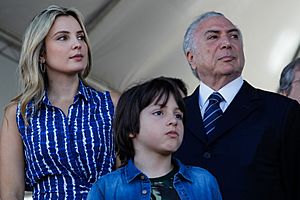
Michel Temer was raised by Maronite parents and identifies as a Catholic.
He has three daughters from his first marriage: Luciana (born 1969), Maristela (born 1972), and Clarissa (born 1974). He also has a son named Eduardo (born 1999).
In 2002, Temer met Marcela Tedeschi. They married in 2003 in a small ceremony. Marcela later earned a law degree. They have a son named Michel, often called "Michelzinho."
Awards and Recognitions
Michel Temer has received many awards and honors throughout his career, both from Brazil and other countries. These awards recognize his service and contributions.
Brazilian Honors
| Ribbon bar | Honour | Date |
|---|---|---|
| Grand Cross of the Order of the Southern Cross | 2016 - automatic upon taking presidential office | |
| Grand Cross of the Order of Rio Branco | 2016 - automatic upon taking presidential office | |
| Grand Cross of the Order of Military Merit | 2016 - automatic upon taking presidential office | |
| Grand Cross of the Order of Naval Merit | 2016 - automatic upon taking presidential office | |
| Grand Cross of the Order of Aeronautical Merit | 2016 - automatic upon taking presidential office | |
| Grand Cross of the Order of Military Judicial Merit | 2016 - automatic upon taking presidential office | |
| Grand Cross of the National Order of Merit | 2016 - automatic upon taking presidential office |
International Honors
| Ribbon bar | Country | Honour | Date |
|---|---|---|---|
| Grand Cross of the Order of the Liberator General San Martín | 2017 | ||
| Grand Cross of Dannebrog | 1999 | ||
| Knight of the Legion of Honor | 1998 | ||
| Grand Cross of the National Order of Merit | 2017 | ||
| Grand Cross of the Order of Christ | 1997 | ||
| Grand Officier of the Order of Prince Henry | 1987 |
Images for kids
-
With Vladimir Putin at the Bolshoi Theatre in Moscow, 20 June 2017
-
Temer and U.S. President Donald Trump during the 12th G20 summit in Germany, 8 July 2017
-
Temer with Russian Prime Minister Dmitry Medvedev in Moscow, June 2017
See also
 In Spanish: Michel Temer para niños
In Spanish: Michel Temer para niños
 | Emma Amos |
 | Edward Mitchell Bannister |
 | Larry D. Alexander |
 | Ernie Barnes |


